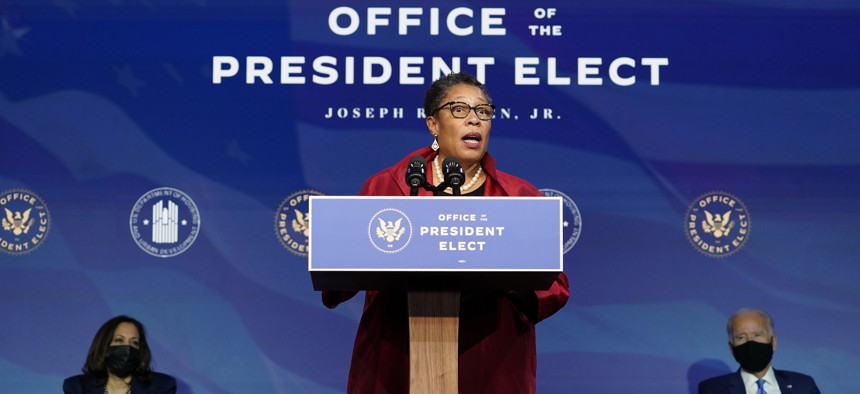HUD Nominee Wants to Ensure Housing Crisis Doesn’t Worsen During Pandemic

Rep. Marcia Fudge, D-Ohio, the Biden administration's choice to be the housing and urban development secretary, speaks during an event at The Queen theater in Wilmington, Del., Friday, Dec. 11, 2020. AP Photo/Susan Walsh
Senators heard from U.S. Rep. Marcia Fudge on Thursday, President Biden’s nominee to lead the Department of Housing and Urban Development. She pledged to head off evictions and reduce discrimination in housing.
Federal and local eviction moratoriums are currently protecting millions of renters from losing their homes as they’ve fallen behind on rent payments during the coronavirus pandemic.
But what happens when the economy recovers, the moratoriums end, and renters are expected to pay back the money they owe?
That’s one of the problems U.S. Rep. Marcia Fudge wants to tackle first if she’s confirmed as President Biden’s nominee to lead the Department of Housing and Urban Development.
“When we come out of this crisis, people are not going to be able to say ‘I’m 15 months behind in rent and I’ll be able to pay that all back now,’” Fudge said during Thursday’s confirmation hearing before the Senate Committee on Banking, Housing, and Urban Affairs. “We have to come up with a policy on how to help people do this.”
The pandemic has exacerbated the affordable housing crisis, with out-of-work Americans falling behind on rent or mortgage payments. Fudge said one of her top priorities would be to provide people the support they need to stabilize their living situation and ensure they do not lose their homes.
“We cannot afford to have millions of people evicted from their homes because then the problem just gets worse,” the Ohio Democrat said.
Other priorities would include expanding housing voucher programs, so that all people eligible for them could receive aid, encouraging additional development of affordable housing, and increasing rates of minority homeownership, Fudge said.
Currently only one in five renter households eligible for federal housing assistance receive it, and Census data shows just 46% of Black families owned homes in 2020 compared to 75% of White families.
Coming up with the cash for a down payment on a home is the biggest impediment to Black homeownership, and the government should address the racial disparity by offering down payment assistance to residents of previously redlined neighborhoods, Fudge said.
“It’s like us being in a race with people who already have a head start,” she said.
Redlining was a federal policy used in the 1930s that ranked neighborhoods as a guide for investment. The rankings took the racial makeup of neighborhoods into account and minority neighborhoods were deemed undesirable, leading banks to deny mortgages to people who sought to buy homes in those areas. Though the practice was banned under the Fair Housing Act in 1968, redlined neighborhoods continue to struggle economically.
As a former mayor of Warrensville Heights, Ohio, Fudge acknowledged that some local zoning rules continue to perpetuate discriminatory practices that prevent greater access to affordable housing.
“We have to get rid of this notion of not in my backyard,” Fudge said. “We have to find incentives for homebuilders, especially those who build multifamily housing, to assist us in these communities to change the zoning laws.”
While some discriminatory practices could be challenged through litigation, Fudge said educating local communities on exclusionary zoning practices, the history of redlining, and about the benefits of affordable housing could also be helpful.
In addition to fielding questions on her policy priorities, Fudge was grilled by Republicans who asked whether she would be able to work in a bipartisan manner given some of her previous derisive remarks about the GOP.
Fudge did not walk back any of her previous statements, and instead described herself as “one of the most bipartisan members in the House of Representatives.”
Andrea Noble is a staff correspondent with Route Fifty.
NEXT STORY: It’s Time to Consider Reviving Federal Revenue Sharing With States and Cities





